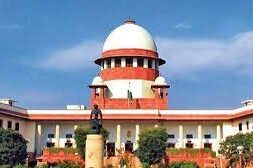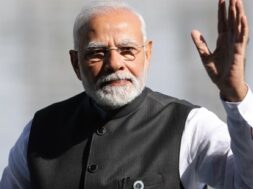
Manas Dasgupta
NEW DELHI, Oct 13: The petitions challenging the Karnataka government’s ban on wearing “hijab” in the classrooms has been referred to the Chief Justice of India after a two-judge bench delivered a split verdict on Thursday, one judge upholding the ban and the other setting it aside and calling wearing of the apparel a “matter of…choice”.
The CJI UU Lalit will now decide whether the issue should be referred to a three-judge larger bench or a five-judge constitution bench for a decision even as one of the judges in the division bench Hemant Gupta, who uphold the Karnataka High Court’s March 15 judgement validating the government’s ban order, retires on October 16. Following the split verdict, the Karnataka education minister said as of now the ban order stayed valid as the high court ruling prevailed in the absence of the Supreme Court unequivocally setting it aside.
Justice Sudhanshu Dhulia who allowed the petition challenging the government’s ban order said the biggest factor in his view was women’s education and nothing should be allowed to come in its way in case banning wearing of hijab restricted Muslim women’s education. “It’s ultimately a matter of choice and nothing else. One thing which was topmost for me was education of the girl child,” said Justice Dhulia.
Justice Dhulia stressed on secularism, constitutional freedoms, and enabling girls’ education. “Amongst many facets of our Constitution, one is Trust. Our Constitution is also a document of Trust. It is the trust the minorities have reposed upon the majority,” Justice Dhulia said.
“It is necessary to have discipline in schools. But discipline not at the cost of freedom, not at the cost of dignity. Asking a pre-university schoolgirl to take off her hijab at her school gate, is an invasion on her privacy and dignity,” the judge said.
“One of the best sights in India today is that of a girl child leaving for her school in the morning, with her school bag on her back. She is our hope, our future. But it is also a fact, that it is much more difficult for a girl child to get education, as compared to her brother,” Justice Dhulia observed.
But in many parts of India, he noted, a girl child had to do household chores before going to school. “Are we making her life any better by doing this (hijab ban)?” He said: “It is ultimately a matter of choice, nothing more, nothing else.” “All the petitioners want is to wear a hijab! Is it too much to ask in a democracy? How is it against public order, morality or health? Or even decency?”
Embracing the Supreme Court’s judgment in the Bijoe Emmanuel case, which had held that courts only need to test whether a practice is prevalent, was established and a bona fide one, Justice Dhulia said wearing hijab meets all the three criteria. In the Bijoe Emmanuel case, the Supreme Court in August 1986 allowed the claim of some students following the Jehovah’s Witness faith to remain silent during the singing of the national anthem in their school in Kerala. The students used to stand up during the recital of the anthem but refused to sing it saying it was against the tenets of their religious faith.
Justice Hemant Gupta, who was the first to read out his judgement, said secularism was applicable to all citizens, so allowing one community to wear religious symbols would be an “antithesis to secularism”. The constitutional goal of fraternity would be defeated if students were allowed to carry religious symbols to the classroom, he asserted.
“Schools run by the state are open for admission irrespective of any religion, race, caste, language… Even the Act mandates that the students would be admitted without any restriction on such grounds. However, students are required to follow the discipline of the school in the matter of uniform,” said the judge.
“The religious belief cannot be carried to a secular school maintained out of state funds. It is open to the students to carry their faith in a school which permits them to wear hijab or any other mark, may be tilak, which can be identified to a person holding a particular religious belief but the state is within its jurisdiction to direct that the apparent symbols of religious beliefs cannot be carried to schools maintained by the state from state funds,” Justice Gupta said.
Justice Gupta said he had framed 11 questions and said answers he found to these all point to the validity of the ban order. Among the questions he raised were whether the appeal should be referred to a Constitution bench, whether colleges can decide on the uniform of students, whether wearing the hijab and restricting it violates the freedom of religion (Article 25), whether Article 25 and Article 19 (Freedom of speech and expression) are mutually exclusive, whether the Karnataka ban infringes upon fundamental rights, if wearing the hijab is essential practice under Islam and whether the government order serves the purpose of access to education.
“The answer, according to me, is against the appellant. I dismiss the appeal,” Justice Gupta said and added he agreed with the Karnataka High Court’s order. The Karnataka High Court had refused to lift the ban on hijab – headscarves worn by some Muslim women – in schools and colleges.
The BJP-ruled state government banned students from wearing hijab on campus on February 5. It was challenged by Muslim girl students in the Karnataka High Court. On March 15, the high court dismissed petitions filed by some Muslim students of Government Pre-University Girls College in Karnataka’s Udupi. The high court ruled that the students’ request to wear the hijab inside classrooms was not a part of the essential religious practice in Islamic faith. The students challenged the High Court order before the Supreme Court.
The split verdict in the Supreme Court today came after the bench of Justices Gupta and Dhulia reserved its judgement on the pleas on September 22. The bench had heard arguments for 10 days before it reserved its verdict.
Lawyers appearing for the petitioners had insisted that preventing the Muslim girls from wearing the hijab to the classroom will jeopardise their education as they might stop attending classes. The lawyers appearing for the state had argued that the Karnataka government order that sparked the controversy was “religion neutral.”













